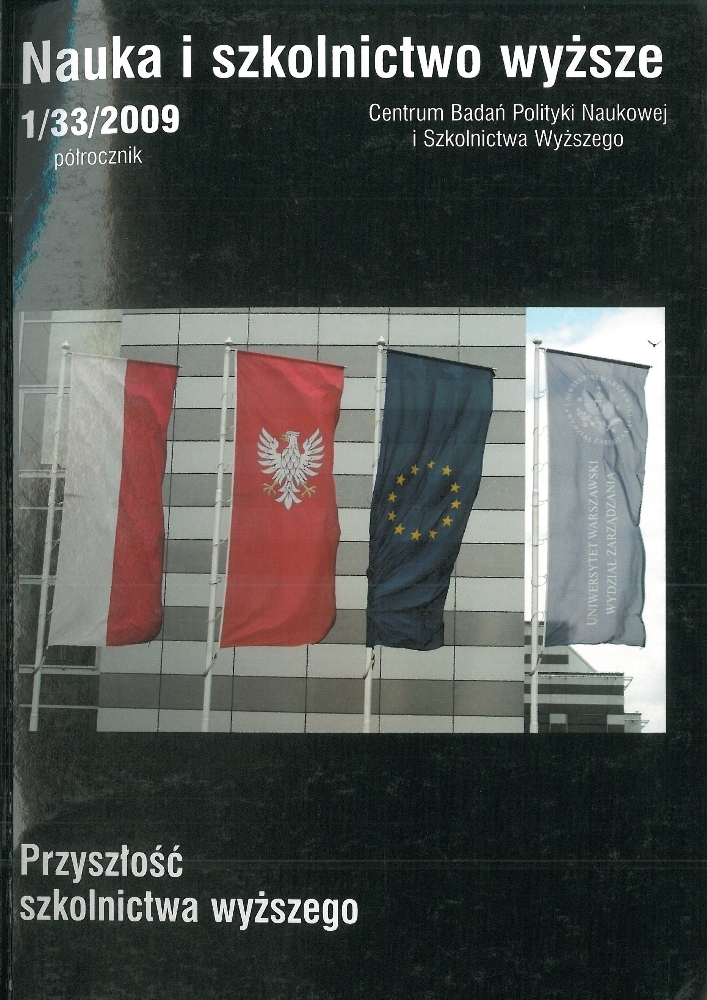Abstract
The author discusses the recent key problems of the higher education system as well as goals and tasks for the futurę, as presented in the two-volume OECD report (Paolo Santiago, Karinę Tremblay, Ester Basri, Elena Arnal: Tertiary Education for the Knowledge Society, vol. 1: Special Features: Governance, Funding, Quality, vol. 2: Special Features: Equity, lnnovation, Labour Market, Internationalisation, OECD, Paris 2008). She presents the views expressed by the report authors (eminent experts) on the following issues: (1) key developments of tertiary education in the last four decades; (2) governance problems in tertiary education (including the role of the State and market, autonomy of universities); (3) the financing of tertiary education (inclcluding tuition fees); 4) changes in the naturę and significance of academic career and the status of an academic teacher; (5) selected aspects of internationalisation of higher education. The discussion brings in interesting data on those specific issues, as mentioned by the report authors.
References
Barr N. 2004 Higher Education Funding, „Oxford Review of Economic Policy”, t. 20, nr 2.
Boarini R., Strauss H. 2007 The Private Internat Rates of Returns to Higher Education, New Estimates for 21 OECD Countries, „OECD Economics Department Working Papers”, nr 591.
Bok D. 2003 Universities in the Marketplace: The Commerciaiization of Higher Education, Princeton University Press, Princeton.
Clark B. 1983 The Higher Education System: Academic Oganization in Cross-national Perspective, University of California Press, Berkeley.
Clark B. 1998 Creating Enterpreneuriai Universities: Organizational Pathways of Transformation, Pergamon Press, Oxford.
Clark B. 2001 The Enterpreneuriai University - New Fundations for Collegiality, Autonomy and Achievement, „Higher Education Management” 1.13 nr 2.
Dąbrowa-Szefler M. 2007 Informacja na temat raportu OECD „Review of Tertiary Education. Poland”, „Nauka i Szkolnictwo Wyższe” nr 2/30.
Dąbrowa-Szefler M., Jabtecka J. 2007 Szkolnictwo wyższe w Polsce. Raport dla OECD, Ministerstwo Nauki i Szkolnictwa Wyższego, Warszawa.
Enders J., Teichler U. 1997 A Victim of Their Own Success? Employment and Working Conditions of Academic Staff in Comparative Perspective, „Higher Education”, t. 34.
Eurostat 2006 EU LaborForce Sun/ey - Principal Results 2005, „Statistics in Focus”, nr 13.
Gibbons M. 1998 Higher Education Relevance in the 21 st Century, The World Bank, Washington.
Goćkowski J. 1999 Uniwersytet i tradycja w nauce, Wydawnictwo „Secesja”, Kraków.
Jacobs B., Van der Ploeg F. 2006 Guide to Reform of Higher Education. A European Perspective, „Economic Policy” t. 21, nr 47.
Johnstone B. 2004 The Economics and Politics of Cost-Sharing in Higher Education: Comparative Perspective, „Economics and Education Review”, nr 23.
Johnstone D.B. 2006 Financing Higher Education: Cost-Sharing in International Perspective, Boston College Center for International Higher Education, ICHEFAP Sens-Publishers, Rotterdam.
Leja K. 2008 Uniwersytet organizacją służącą otoczeniu, w: K. Leja (red.): Społeczna odpowiedzialność uczelni, Politechnika Gdańska i Uniwersytet Gdański, Gdańsk.
McMahon W.W. 2004 The SociaiandExternal Benefits ofEducation, w: G. Johnes, J. Johnes (red.): International Handbook on the Economics of Education, Edward Elgar, Cheltenham.
Oliveira Martins J. i in. 2007 The Policy Determinants in Higher Education, „OECD Economics Department Working Papers”, nr 576.
Pelc J. 1995 Ocena indywidualna naukowców i zespołów naukowych, „Zagadnienia Naukoznawstwa” nr 3-4.
Psacharopoulos G. 1994 Returns to lnvestment in Education: A Global Update, „World Development”, nr 22 (9).
Psacharopoulos G., Patrenos H. 2004 Human Capital and Roies of Return, w: G. Johnes, J. Johnes (red.): International Handbook on the Economics of Education, Edward Elgar, Cheltenham.
Rocznik... 2006 Rocznik statystyczny 2006, Główny Urząd Statystyczny, Warszawa.
Salmi J. 2003 łndicators for Tertiary Education Reform: A World Bank Perspective, w: A. Yonezawa, F. Kaiser (red.): System-level and Strategie łndicators for Monitoring Higher Education in the Twenty-first Century: Studies on Higher Education, UNESCO-CEPES, Bucarest.
Sowa K.Z. 2008 Społeczne funkcje uniwersytetu. Uwagi socjologa, „Forum Akademickie”, nr 3.
UNESCO 2006 Global Education Digest, UNESCO Institute for Statistics, Montreal.
Vught F. van 1989 Governmental Strategies and lnnovation in Higher Education, Jessica Kingsley, London.
Wójcicka M. 2006 Uniwersytet i jego otoczenie - dwa sposoby podejścia i ich możliwe konsekwencje, w: K. Leja (red.): Problemy zarządzania w uczelni opartej na wiedzy, Politechnika Gdańska, Gdańsk.
Ziabicki A. 2002 Ocena dorobku i reputacji naukowej indywidualnych uczonych i zespołów badawczych, „Zagadnienia Naukoznawstwa”, nr 1-2.
